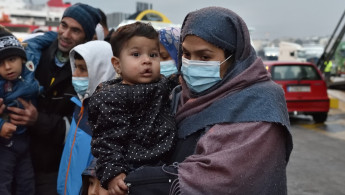Follow us on Facebook, Twitter and Instagram to stay connected
More than 11,000 refugees have to leave their social housing, face homelessness under Greek law
Many refugees in Greece face homelessness as evictions mean they're desperate for accommodation.
3 min read
Asylum Seekers Arrive At The Port Of Piraeus As Greece Lifts Coronavirus Lockdown [Getty]
Tens of thousands of refugees in Greece could soon be evicted from social housing as changes in their status could cause them to be homeless.
Over 11,000 refugees have been told to vacate their government accommodation this month. On 1 June all refugees who received international protection before 1 May 2020 can no longer stay at reception facilities that had previously been available to them.
A change in the law earlier this year meant that whilst previously those who are currently in the reception system were allowed to stay for a grace period of six months as they look for alternative housing, they now only have one month to leave.
Some 11,237 people are set to be evicted from reception and identification centres, camps, and hotels, according to NGO Refugee Support Aegean (RSA) and includes people in housing provides through special programs like ESTIA (European Emergency Support to Integration and Accommodation), supported by the European Union and UNHCR.
Many of those impacted by the evictions are vulnerable, including families with small children, the elderly and those struggling with mental and physical health problems, according to a report by AFP.
On 1 June many refugees had left, and though there have yet to be reports of forced evictions being carried out, experts are concerned that will be the next step.
It is not clear if alternative accommodation will be provided to those evicted.
Greece decided to speed up the process of removing refugees from the reception system in an effort to transfer asylum seekers from overcrowded facilities like Moria, on the island of Lesbos.
Some 115,600 migrants, asylum seekers and refugees are currently being processed in Greece.
|
"There is a wildly different system of support and set of rights for a person who is an asylum seeker, whose application is still pending, and a beneficiary of international protection," Minos Mouzourakis, legal officer for RSA, told InfoMigrants.
When a person gets international protection, "because their legal status changes, their legal entitlements are completely different," he said.
Since March, people can only stay in the reception system for one – not six – months.
Camps and coronavirus
Greece has extended for another two weeks a coronavirus lockdown on its overcrowded migrant camps as the country gears up to revive its tourism-dependent economy.
"For residents of the reception and identification centres across the country, measures against the propagation of the Covid-19 virus are extended" until June 21, the official Government Gazette said.
Greece appears to have fared better than most of its European partners in the coronavirus pandemic, with 180 deaths and 2,980 cases.
It was quick to introduce strict confinement measures on migrant camps on March 21 and imposed a more general lockdown on March 23.
More than 33,000 asylum seekers live in the five camps on the Aegean islands, with a total capacity of 5,400 people, and some 70,000 in other facilities on the mainland.
While no known deaths have been recorded in the camps so far due to Covid-19 and only a few dozen infections, the measures have since been extended a number of times.
Rights groups have expressed concern that migrants' rights could be eroded by the anti-virus restrictions.
Massive virus screening in the camps only started in early May.
The new extension to the lockdown on the camps comes after Greek Prime Minister Kyriakos Mitsotakis unveiled a new tourism campaign, saying: "We are opening Greece's windows and doors to the world gradually but with optimism."





 Follow the Middle East's top stories in English at The New Arab on Google News
Follow the Middle East's top stories in English at The New Arab on Google News


